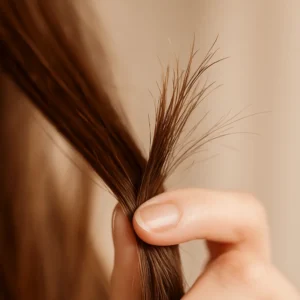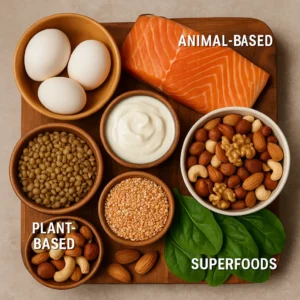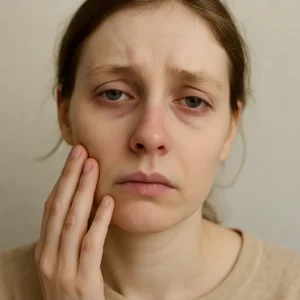Why Hair and Skin Need Protein: The Science of Beauty from Within
When we think of beauty, we often imagine creams, oils, and treatments. But the real secret to glowing skin and strong, shiny hair lies deeper—in the proteins that build them.
Your hair is made of keratin, your skin thrives on collagen and elastin, and your body depends on amino acids to repair and renew cells. Without enough protein in your diet, no amount of external care can fully protect your skin and hair.
In this blog, we’ll explore the science, benefits, and practical tips on why protein is essential for hair and skin health.
The Building Blocks: What Protein Does for Hair and Skin

Hair
-
Hair is 95% keratin, a fibrous protein built from amino acids.
-
Keratin determines strength, elasticity, and shine.
-
Protein deficiency makes hair brittle, thin, and prone to breakage.
Skin
-
Skin relies on collagen (structural support) and elastin (flexibility).
-
Both are proteins that decline with age, leading to wrinkles and sagging.
-
Adequate dietary protein ensures the body keeps producing collagen.
Scientific Evidence
-
Keratin Supplements Improve Hair & Skin: A clinical study found that oral keratin supplementation reduced hair loss by 43.1% and improved skin elasticity.
-
Collagen Peptides Boost Skin & Hair: A 12-week trial showed collagen intake improved skin hydration, elasticity, and scalp/hair condition.
-
Nutrition Directly Impacts Skin Health: Reviews confirm that protein intake affects collagen and elastin synthesis, influencing skin repair and resilience.
What Happens Without Enough Protein?
-
Hair: Breakage, dullness, thinning, excessive shedding.
-
Skin: Loss of elasticity, sagging, dryness, delayed wound healing.
-
Nails: Weak, brittle, prone to peeling.
-
Overall health: Fatigue, weakened immunity, muscle loss.
Best Protein Sources for Hair & Skin

Animal-Based
-
Eggs (rich in biotin + protein)
-
Fish (omega-3 + collagen-supporting protein)
-
Chicken, turkey
-
Dairy (milk, paneer, yogurt)
Plant-Based
-
Lentils, chickpeas, beans
-
Nuts & seeds (almonds, pumpkin seeds, chia)
-
Quinoa (complete plant protein)
-
Soy (tofu, tempeh, soy milk)
Superfoods
-
Bone broth: natural collagen
-
Spirulina: contains all essential amino acids
-
Pumpkin seeds: protein + zinc for hair growth
How Much Protein Do You Really Need?
-
General adults: 0.8g protein per kg body weight
-
Active adults: 1.2–1.6g/kg
-
For beauty benefits (hair/skin repair): aim for 20–30g protein per meal
Lifestyle & Protein Synergy
Protein’s benefits are maximized when combined with:
-
Vitamin C → needed to produce collagen.
-
Zinc & Iron → support keratin structure.
-
Hydration → helps proteins function properly.
-
Adequate sleep → nighttime is when collagen repairs skin.
Protein in Anti-Aging Skin Care

As we age, our body’s ability to make collagen naturally declines—dropping by nearly 1% every year after the age of 25. By the time we’re in our 40s, fine lines, wrinkles, and sagging become visible.
While external creams help, dietary protein is the only way to continuously supply amino acids needed to rebuild collagen from within. Clinical trials show that collagen supplementation for 12 weeks not only improves skin elasticity but also reduces visible wrinkles.
This means anti-aging truly begins with protein intake, not just external skincare.
Protein and Hormonal Health for Skin & Hair
Hormonal fluctuations—such as thyroid imbalances, PCOS, or menopause—affect hair and skin. Adequate protein helps:
-
Balance blood sugar → stabilizing insulin, which in turn supports hormonal balance.
-
Support thyroid hormones → amino acids like tyrosine are needed for thyroid hormone production.
-
Regulate sebum production → reducing acne flare-ups linked to hormones.
Thus, protein indirectly keeps skin clearer and hair stronger by supporting hormonal health.
Practical Tips to Boost Protein Intake
-
Start your day with a protein-rich breakfast (eggs, sprouts, Greek yogurt).
-
Replace refined snacks with nuts, seeds, or protein smoothies.
-
Use protein hair masks (egg + yogurt) for topical nourishment.
-
Combine protein with antioxidants (amla, berries) for skin glow.
-
Snack on roasted chickpeas, soy chaat, or boiled eggs.
-
Add protein powder (plant or whey) to smoothies.
-
Replace refined carbs at dinner with quinoa + dal.
Myths vs Facts
| Myth | Fact |
|---|---|
| “Protein is only for bodybuilders” | Every cell in your body, including skin and hair, depends on protein. |
| “Vegetarians can’t get enough protein” | Lentils, beans, soy, quinoa, nuts provide complete protein when combined. |
| “Collagen creams work the same as protein foods” | Collagen molecules are too large to penetrate skin—oral intake is more effective. |
Preventive & Healing Role
-
Anti-aging: Protein slows collagen loss, delaying wrinkles.
-
Postpartum: Helps mothers recover hair loss and skin changes.
-
Stress repair: Chronic stress increases protein breakdown—extra protein aids recovery.
-
Wound healing: Protein supports tissue repair and scar healing.
Final Takeaway
When you invest in protein, you’re not just building muscles—you’re building beauty, resilience, and youthfulness.
From keratin powering your strands to collagen supporting your skin, proteins are the foundation of beauty and health. When combined with vitamins, minerals, hydration, and sleep, they create a natural glow that no cosmetic can replace.
✨ True beauty is not in a bottle—it’s in the proteins your body thrives on daily.

Leave a Reply